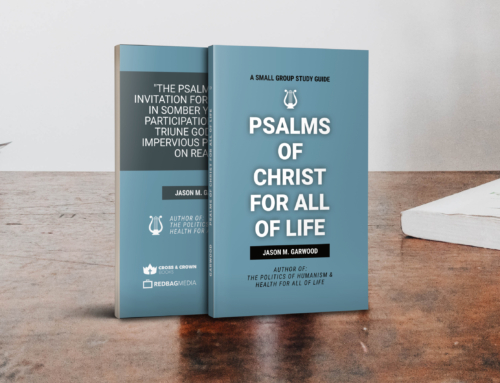We live in a culture of death. A world where little humans are assassinated every single day. We live in a world where pre-born children have their limbs torn from them, and their body parts sold for gain. We live in a world where the most helpless neighbors among us are poisoned and then disposed of. This world we live in allows murder to take place while simultaneously making attempts at redefining what is actually taking place. Abortion is murder, and the butchering continues unabated. We live in a world where little men and women have their skulls crushed on a daily basis. Let that sink in.
We also live in a world where most Christians don’t do anything about it, save for an annual sermon from the pastor we might call “lip service”—after all, pastors are caught between a rock and hard place: take seriously the Kingdom of God and upset the financial donors and maybe lose their job, or keep the rhetoric tamed down and don’t rock the boat. Jesus said to count the cost and it is evident what decision most of them make.
Furthermore, the Christians who do attempt to do something about the holocaust are ostracized and slandered by the gatekeeping elites of evangelicalism and the very majority of Christians who aren’t doing a thing to see the slaughter end. This is our culture, our world, right now. It won’t be our world, our reality someday, but for now this is the world Jesus came to save and we would do well to understand it for what it is, not what we pretend it isn’t.
One of the most devastating critiques of Evangelicalism today is found in our very own Scriptures. (Imagine that: religious people have something to repent of!) The verse in question is found in the book of James 1:22, and it goes like this: “But prove yourselves doers of the word, and not merely hearers who delude themselves.”
In other words, true faith—true belief in the gospel—is faith that works itself out in obedience to God’s law-word. To be a doer of the word is to be a covenantal man, and to be a covenantal man is to take that which the gospel gives you, and produce results. We are after economic productivity in every realm; all of Christ, for all of life. That’s just what the gospel, when properly understood, does. But before we unpack the gospel of the Kingdom, I want to help us understand that which presupposes the gospel, namely, the problem of sin, and fallen men in a rebellious world.
When Satan tempted Adam and Eve, he offered them several things. To begin, when he told them “You surely will not die!” Satan questioned God’s predestinating governance of man. God isn’t sovereign, God isn’t in charge of all things, thus, God’s law is arbitrary and God’s world completely unpredictable. God’s decrees are meaningless, and the consequences for disobeying God’s law aren’t legitimate. The world is free for man to explore and make his own meaning—become a law unto yourself, Satan urges, because you won’t die. God’s just jealous.
Satan continues: because God’s law can be questioned, it is clear, then, that God wants to frustrate men, and prevent them from self-discovery. To obey God’s law is enslavement, Satan reasons, therefore, to be a truly liberated man, one must disregard the commands of God. Law is oppression, rebellion is freedom. Satan was the first anarchist; he was also the first statist. (By the way, do you know what the difference is between an anarchist and statist? A necktie. One just looks a little nicer; they are both the fruit of lawlessness.)
At any rate, the politics of rebellious humanity stems from another presupposition of Satan: “You won’t die! Besides, God knows that when you eat of that tree, you’ll be like God (that is, become god), and you’ll be able to determine good and evil, like God does.” It’s not enough to disregard God’s law, one must establish his own law, his own godhead in place of it. Man must assert his own sovereignty and develop his own theology. Thus the war in our culture: the pantheon sounds great until there’re too many gods calling the shots. Neutrality is like juggling knives, eventually someone’s going to get hurt.
The final stage of man’s rebellion comes here in Genesis 3 when man longs to become his own determiner of law. Autonomy was the promise of Satan. No more transcendent, sovereignty of God. No more oppressive laws. Good and evil can be shaped however one thinks best. Thus the philosophy of Sartre: man is not a creature of God, man makes his own existence; a loss of freedom of choice is now evil. Undermine God, you’ll be fine.
These elements are the problems we see facing us right now in this nation. 1) God isn’t sovereign; 2) His law is no good; 3) His governance is unwise. God needs our help. And herein lies the tension: does the gospel that Jesus proclaimed have anything to do with resolving any of these problems from Genesis 3? The answer, of course, is yes.
The Kingdom of God is the covenantal social order of heaven coming to bear on earth. The good news isn’t simply that forgiveness of sins can be had; it’s not about the ticket to heaven being punched. The good news is for the world, all of the world, and everything in the world. It does answer the problem of Genesis 3, for the gospel establishes: 1) God is sovereign; 2) God’s law is good and just and right; 3) God’s governance of the world does matter, and Jesus is very much interested in what goes on in the here and now. Yes, the gospel is the power of God for salvation; but anything less than the salvation of men and his institutions, culture, and productivity is a truncated gospel.
And a truncated gospel is what passes in most churches today. Jesus’ message is boiled down to a simple prayer so you can go to heaven when you die. And this isn’t merely asserted, it’s staunchly defended. “How can you possibly go to the abortion mill! Jesus just wants us to preach the gospel, not get caught up in changing culture!” Ok, let’s run with that–
Did Noah “just preach the gospel” when he told everyone to repent or they would drown? Did Moses “just preach the gospel” when he demanded that Pharaoh, a magistrate, release God’s people and learn his proper role? Did Joshua “just preach the gospel” when the Canaanites were vomited out of the land for transgressing God’s law? Did the prophets “just preach the gospel”? How about Elijah who took the sword to the priests of Baal? Did he at any point during the slaughter ask them to ask Jesus into their hearts? What about John the Baptist: did he “just preach the gospel” when he told Herod, “It is not lawful for you to have her?” Did Jesus “just preach the gospel” when he excoriated the Pharisees for being a bunch of halfwit ninnies?
The problem with this line of thinking is that the gospel is truncated to the point where it does nothing for the here and now. It is situated only in eternity and it does nothing for a person in history. That is the average ostensible evangelical’s gospel. But the gospel is not some detached concept that is other-wordly; it’s not detached from God’s covenantal order and plan for the world, either. Those who fail to see how the gospel actually impacts all things are those who fail to grasp the all-encompassing nature of the good news of the Kingdom of God.
Proclaiming the substitution of Christ in the gospel in a world stained by sin necessarily entails that we point out the folly of other false atonements. Everyone is looking for a blood sacrifice somewhere. Since this is God’s covenantal world, nothing is neutral. Since nothing is neutral, atonement is inescapable. Since atonement is inescapable, we must say that the true gospel we proclaim is adoption by propitiation. We are adopted into sonship by Christ’s atonement. His blood is the only true atonement, the only true adoption. The blood of children left in the wake of Roe cannot atone for our sins. It’s a false atonement and the proclamation of the gospel in this culture of death means that we must show where true atonement lies.
One of the problems when it comes to the Church’s understanding of the relationship between the gospel and abolitionist ideology, is the issue of abolition itself. Christians fail to see how the gospel connects to our work in the world. When Jesus Christ came, he did so as the Ultimate Abolitionist: He came to put an end to Satan, sin, and death. The gospel announcement is all about abolition. In fact, the gospel announcement is very simple: the Abolitionist has come, and He is the Lamb of God who takes away the sin of the world. This is our atonement. This is the only atonement.
And atonement is uniquely tied to God’s ethical/judicial governance of the world. Since God’s law sets the terms and conditions, and since God imputes meaning, jurisdiction, and purpose for His creation, the gospel fits into the same paradigm: the gospel is about atonement, and atonement is about justice; after all, the foundation of God’s throne is righteousness and justice.
Because God is the transcendent lawgiver, man is underneath His authority. For the rebellious man, the curse of sin enslaves him—it’s all he knows. He isn’t neutral, and he isn’t a friend of God; he is an enemy of God. Therefore, the blood-guilt lies upon him. Rebellious man needs atonement; he owes a debt, and he cannot pay it. So, where does he go to get it? The Mill.
Instead of trusting in the blood of Christ, rebellious men trust in the blood of infants. And because God’s law hangs over rebellious man, furthering his rebellion and shining a light on his sin, God will deal with this person in history and in hell. There are two ways in which God destroys his enemies: he either converts them and makes them a friend, or he breaks them so that they are no longer relevant in history. This is true justice.
The problem comes in when we talk about defining ethics and justice in our culture. Everyone wants to talk about justice, no one wants to do the hard thing to get there, including actually defining it in accordance to the law of God, and carrying it out according to His parameters. Justice is the natural outworking of the gospel. Justice and biblical ethics applied is the gospel applied. Jesus is Lord, and it matters that civil magistrates obey Him per Psalm 2. Yes, the gospel is about God saving sinners for heaven; no, that’s not all it is. The good news of Christ enthroned means that what goes on in His world matters. It is, after all, the kingdom of God—the rule and reign of Christ—scepter and all. Thus we are to contend for the faith in all areas of life. Our neighbors are under attack, therefore, the gospel is under attack—and we’re supposed to be on the offensive.
The kingdom of the world has become the kingdom of our Lord. Which means if you must talk about two kingdoms, it’s not a kingdom of man over here, and Christ’s kingdom over there. There is Christ’s kingdom in heaven, and Christ’s kingdom on earth—the two in principle are one, and in reality, they will become one cohesive thing. But notice what Revelation 11:15 says: “The kingdom of the world has become the kingdom of our Lord and of His Christ; and He will reign forever and ever.” Has. As in, the gospel has established this fact in history.
So, in short, Jesus is Lord and our job is to make sure everyone else is upset about it. Jesus didn’t die to get His Church so she could sit on her hands and remain idle! If the gospel you believe in your head hasn’t compelled you to labor for justice with your hands, you don’t really understand the true gospel in your heart. The problem with Christians anymore is that we’re not getting thrown out of places because we’re not saying anything of significance. But here we stand, and we say, Jesus is Lord.
But you can’t say, “Jesus is Lord,” while simultaneously refusing to press His crown rights into everything. This is the error of the Two-kingdom folks. They want all the glory of Christ’s dominion, but they want to manage it on their dualistic terms. When we say that Jesus is Lord, we are saying that Jesus gets to tell Caesar what to do. And what Caesar needs to do is end abortion now.
You can’t have it both ways, Church. You can’t say that Jesus is King of kings, but not really “kings.” You cannot claim the Lordship of Christ over everything in your theology, and then castrate that authority by really believing, “Well, He’s not Lord over that.”
When we say that Jesus is Lord over Caesar, and that Caesar must protect the preborn, we are declaring war on the gods of this age, which is secular humanism. Because the tomb is empty, babies must be rescued. Because Jesus walked out of the tomb with authoritative, gospel-centered swagger, secularism, and all her pretended neutrality, has lost. The powers that the humanists think they have are really just pretend powers. The triumph of Christ over the grave is simultaneously the triumph of Christ over the powers and principalities. This means that the humanists are impotent, and history belongs to God’s people. Listen…
Regarding abortion, the Kingdom of God wants nothing to do with incremental compromise. It wants nothing to do with partial dominion in the world. The gospel of the Kingdom is comprehensive because the world is in comprehensive sin. Because Jesus is Lord, our job is to announce that in the capital city, the new King is now enthroned. He bought the world with His blood, and now it belongs to His meek children as an inheritance. Nothing short of worldwide conquest will do. Incrementalism is at odds with the gospel because Jesus didn’t sort of die and only somewhat defeat death. He abolished death; therefore, we must abolish human abortion.
When Jesus gave the great commission, He did so with the entire world in mind. Because the Kingdom was breaking in, it was now the political assembly’s job (who we call the “Church”) to rid the lands of idols, gut the pantheons, and reconstruct society based upon the law-word of God. In other words, you don’t get to say, “Jesus is Lord!” and follow that up with “I’m not in to politics.” No, when we say Jesus is Lord over this, that, and everything, we are already involved in politics.
So, here are our options: 1) Jesus doesn’t really care about abortion, nor does He have an opinion on it. 2) Jesus is okay with it. 3) Jesus hates it and wants it to be abolished now. How the church has responded to this thus far shows me that the preferred option is #1 and #2. If #3 was really believed, we would have millions upon millions of Christians demanding the complete abolition of abortion in this country.
Since there is no neutrality, we will either make war against child sacrifice and thus have peace with God, or we will find ourselves at peace with child sacrifice and thus be at war with God. Sadly, the modern church has opted for the latter. God hates hands that shed innocent blood and most Christians seem fine with what God hates.
To summarize where we’ve been so far: The gospel is about the Kingdom of God on earth. The Kingdom has an ethical/judicial aspect to it. It’s about righteousness and justice. Abolition stems from the Lamb of God who is The Abolitionist par excellence, and because the Kingdom of God is a present reality with Christ’s Lordship at the helm, abortion must be abolished because murder violates the commands of God. But I’m not at all finished.
The problems that abolitionists are up against are two-fold: 1) We live in a society completely at odds with the gospel, and thus completely at peace with killing children. 2) We have churches that are apathetic and unmoved. Regarding the society at large, abolitionists want the Lordship of Christ acknowledged. That’s why the gospel is one of our tenants. We are abolitionists because we refuse to compromise with our secular overlords who just want a dash, a little bit, of Christianity in the recipe of culture. For us, we’re not content with that. All the ingredients must be Christian, including the right to live and not be murdered. So, that’s why the gospel is preached at the abortion mill.
As far as society is concerned, there was a change, a shift in how we talk about these things. The shift in our culture was to take sins that are expressly forbidden in Scripture, politicize them by sprinkling in false pretenses of neutrality, and then attempting to gun down the church. Murder became “choice,” theft becomes “taxation,” and homosexuality became “marriage.”
So, because we love the gospel and desire King Jesus to be acknowledged we won’t play that game. We refuse to let a culture at odds with Christ redefine the world. We will not allow tyranny to work itself in disguise. We will not go with the pro-life movement and downplay what this is. If “pro-life” means we organize a website, throw some dollars somewhere at some nice looking execs, and keep kicking the can down the street, then no one should be pro-life. We are abolitionists because the gospel demands it.
But what about the Church? Yes, we’re at odds with people who hate God, because people who hate God, Scripture says, “love death.” But what about the Church? Peter tells us that judgment starts with the house of God—and that is not a term of endearment.
One of the biggest problems is the gospel-centered movement. The empty rhetoric of the latest evangelical fad of being gospel-centered is nothing more than another ploy to keep the church looking busy. True gospel-centeredness isn’t a blog article about the doctrines of grace. True gospel-centered living is actually doing what the cross did—intervention. When we as kings and priests intervene to rescue our preborn neighbors from death, we are mimicking the gospel. You can write books about being gospel-centered all day and it won’t mean a thing; not until a person actually, and physically, intervenes does one become truly gospel-centered.
So don’t tell me you have a gospel-centered church when you do nothing to intervene for our most helpless neighbors! Don’t tell me you have a gospel-centered church when all you pursue is favor with the world, comfort, and pietistic drivel. The gospel is about the Kingdom, and the Kingdom is about power, not talk.
So, we’re up against a culture that loves death, and we’re up against a church that’s obsessed with Jesus Calling. We have feminists who are inconsistent and blood-thirsty, just like their fearless leader Cecile, and we have churches whose eschatology is escapology—a view of the world that renders them useless in the here and now.
The elite members of the Evangelical Ministerial Complex sit in their ivory towers and slander abolitionists who are soldiers in Christ’s army. The constituents of said tower ministries think that by sending money to their favorite 501(c)3 ministries that they are helping things. Sure, they don’t like abortion, but they don’t hate it enough to quite perpetuating the cycle of apathy. And on and on we go on the pro-life merry-go-round. Are we having fun?
And then there’s the incrementalists. The halfsies who think their partisan politics are better than nothing. The problem with incrementalism is that it invites the judgment of God; it tries to manage sin instead of repent of it immediately. And you can’t manage a flood that comes with 10,000 foot waves. Abortion must be abolished as quickly as death was abolished when Christ said, “It is finished.” Anything short of immediate abolition is a continual provocation of the wrath of God.
To the world we say, “repent and believe the gospel.” To the church we say, “Repent and believe the gospel.” Abolition is a way of life rooted in the gospel. It’s obedience to God. It’s taking up your cross in the every day. To be a Christian is to be committed to the gospel; to be committed to the gospel is to be committed to justice—we are Christians, which means we are called to rescue.
The reason the gospel of Christ necessitates abolition is because the very nature of the gospel is abolition. Abolition simply means the application of the claims of Christ to everything Christ claims. If it is true, and it is, that Christ owns the State, then the State must obey Christ’s claim on it. If Christ owns the Church, then the Church must obey Christ’s claim on her, too. If Christ lays claim to everything in this world, from individuals, to governments, and every single institution in between, then the only thing left for us to do is press the claims of Christ into those areas. That is the gospel, and the ethical imperative of abolition. And here’s the thing…
We are not fighting because we love to fight. We are fighting because we love truth, and truth is being assailed. What we want is for Christians to be left alone, and our neighbors to be left alone. We love God and neighbor that much. The problem is, our most vulnerable neighbors are being ripped apart, limb from limb, and now we are going to have to get rowdy. We didn’t go looking for a fight, the fight was brought to us. So here we stand, and we will not be quiet. We will not go away, not until the last planned parenthood doors are locked for the final time.
Jesus is Lord. And we mean it. Pray with me.
Father, we as a nation have rebelled against your statutes. We have spit upon your law and regarded quite readily iniquity in our hearts. We as abolitionists are first in the repentance line, for we too, are guilty of much of the same sins. Heavenly Father, I beg of you to grant repentance to this nation. Give repentance to the Church, but also give it to this country. We have continued the slaughter and we deserve nothing short of fiery judgment. We have trampled your long suffering and forgotten about your mercy, so help us, Lord, by raising up legislatures with steel in their spine and courage in their hearts. May they stand against the holocaust by fulfilling their roles as magistrates under your authority. In Christ’s name we pray, Amen.
*This message was preached on February 24, 2017 at the Abolish Human Abortion Conference and Rally at the Texas State Capital Building in Austin, Texas. © 2017 Rev. Dr. Jason M. Garwood






Leave A Comment